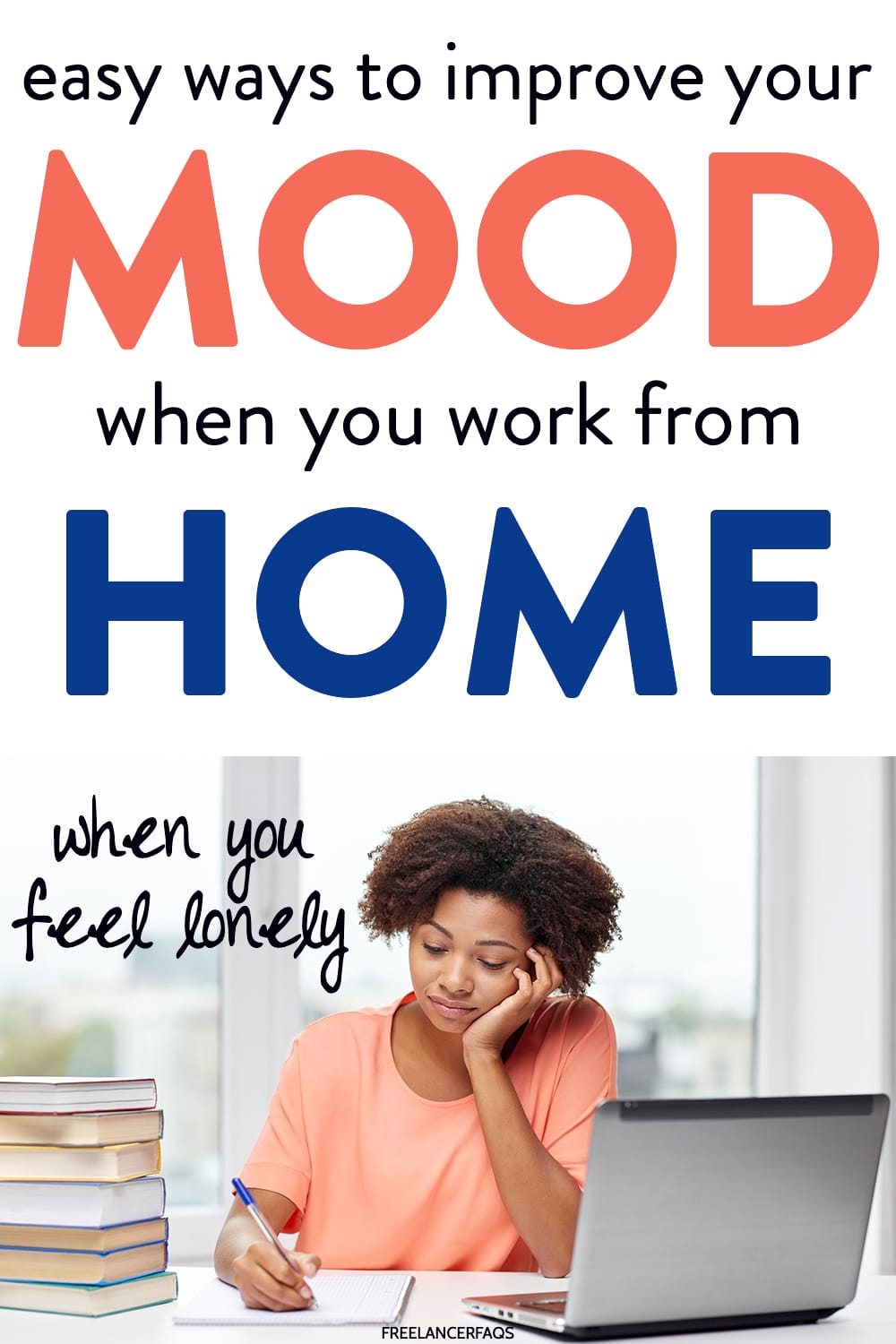Have you ever worked in an office environment?
If you have, then you know that the constant meetings, team-building exercises, and office politics can wear you down over time and cause some serious mental health problems.

Throw an introverted personality into the mix, and those day-to-day interactions with clients and colleagues can feel downright oppressive.
[T]he shift from being employed to working for yourself can be pretty jarring[.]
While this is not necessarily the biggest reason why many people choose the freelance life, it’s often a big part of their decision.
Whether or not this has been your experience, there is little doubt that freelancing affords many people delightful freedoms that they wouldn’t otherwise have experienced under different working circumstances, from the privilege to set their own schedules to the ability to work from anywhere in the world.
But the shift from being employed to working for yourself can be pretty jarring – especially when you think about the barriers to mental health when you freelance.
When the dust settles, writers often find that a host of new struggles accompanies the perks of freelancing.
For instance, while your daily schedule was once padded with activities dictated by your superiors, it’s now up to you to formulate a structured routine.
When building a business, it’s easy to allow the workday to bleed well into the night, resulting in a shortage of sleep.
All of a sudden, there is this enormous pressure to perform, because the only thing standing between success and failure is you.
On top of all that, freelancing is often pretty lonely.
Even extreme introverts can eventually start to feel isolated and may catch themselves reminiscing about that old office banter by the fax machine.
Over time, these barriers to mental health can chip insidiously away at one’s mental health and add up to some serious emotional struggles.
And the mayhem of 2020 has escalated these already-existing challenges for many writers out there.
Mental health is a complex area, and there no quick fixes. However, there are several tried and true measures you can take to improve things so that you don’t have barriers to mental health when you go freelance.
What are the Barries to Mental Health?
As mentioned, mental health problems happen in the office and when you work from home.
And with COVID and social distancing and your life, it’s the the perfect storm for a host of barriers to mental health.
Let’s look at these barriers and how to position them to help you improve your mental health.
1. Lack of Prioritizing Your Physical Health
A huge barrier to mental health is your physical health.
Over the years, there has been a parade of mental health facts that demonstrate a clear, unambiguous connection between mental health and physical health.
So strong is their relationship that neglecting one can have severe consequences on the other, and vice versa.
If you want to maintain your mental health, it is vital to protect your physical health through adequate sleep, regular physical activity, a balanced diet, avoiding excessive drinking, and so on.
Rather than thinking of these things as a burden, try to have some fun with them.
For example, work your way through a healthy cookbook, and choose fun exercises.
Productivity experts talk about this so often that it has basically become a clichè, but the benefits of a daily routine, such as its ability to bolster brain health, are hard to dispute.
The human brain thrives on patterns and regimes, which is part of the reason why an absence of structure can really throw you off.
Regularity can drastically reduce stress levels by minimizing uncertainties and allowing you to focus on the things that are within your control.
Create a routine that includes simple things like waking up around the same time, making your bed, and then sitting outside with a cup of coffee.
If you are finding barriers to your mental health when trying to create a routine try doing these things:
- Find one thing to create a habit around. It might be to brush your hair each morning or to kiss and hug your family once a day. Find something to connect with your day – one small thing – and do that every day.
- Set your day up for a routine the night before. If you like to drink coffee in the morning, have your coffee maker prepped and ready. If you wear slippers when you work from home, have them in front of your bed in the morning. These little things will create a routine.
- Consider starting your day with meditation. This will lower your stress level, improve your mental health and mood and set up you for a productive day.
It is not necessary to schedule every second of every day, leaving no room for spontaneity; just have a few consistent checkpoints to keep yourself oriented.
2. Stopping Getting “Dressed” for Work
 Do you work from home in your pj’s?
Do you work from home in your pj’s?
This could be one of the many barriers to mental health!
There has long been a case for dressing up even while working from home, but in light of the recent pandemic, many are arguing that it may be more important than ever.
You can use clothes to switch your brain from lounge mode to work mode, adding an extra boost of motivation.
Even just changing into clothes that you didn’t sleep in (such as a loungewear set) can provide a sense of purpose, dignity, and self-respect, all of which are crucial for mental health.
If you take it up a notch and dress in clothes you would feel comfortable leaving the house in, you’re more likely to approach your day with confidence.
3. Forgetting to Find a (New) Hobby
If you’re anything like me, then your writing was once just a hobby, and now it’s a living.
It’s a beautiful thing to be able to generate income out of something you love to do, but work-life balance threatens to deteriorate when the line between work and recreational activities gets blurred or vanishes altogether.
It really helps to develop other interests, be they cooking, bullet journaling, watercolor painting, or birdwatching.
New hobbies (preferably ones that you do not intend to turn into some sort of side hustle) will help you to establish a clear boundary between work and play, allowing you to optimize both.
4. Not Changing Up Your Work Environment
What’s that term for the awful feeling you get when you’ve been confined in the same location for an extended period, causing a lack of motivation, restlessness, and irritability?
Oh yeah. Cabin fever.
It goes without saying that, due to lockdown, we’re facing unprecedented times where the battle with this feeling is at an all-time high.
However, as restrictions slowly lift, it can be mentally beneficial to brainstorm one or two back-up work locations, even if you love your home office.
To avoid barriers to mental health, consider going to libraries, bookstores, and coffee shops to sit and work.
You can also rent a coworking space for a day to simulate a real office environment once in a while.
Humans are social creatures, so even just soaking in the background hum of life going on in other locations can do wonders for your mind and emotions.
5. Thinking of Doing this Alone & Not Talking to Someone
Depending on how severe your current mental state is, some of the earlier suggestions might sound about as effective as a bandaid on a stab wound.
If that is the case, it could be time to consider talking to a therapist.
These are trained professionals who can help you to process and work through some specific feelings, as well as give you tools to improve your cognitive and emotional skills in general.
Online therapy is often much more affordable than traditional, in-person therapy.
Note: Despite this point’s position on our list, therapy should not be considered a last resort. In many cases, getting help early can prevent you from tumbling down a slippery slope that will be difficult to recover from later on.
As someone who tends to internalize all of her feelings, I cannot stress this enough:
Talk. About. Your problems.
You can talk to a close neighbor, your spouse, strangers in a safe online chat group, whatever.
Just don’t let your frustrations build up inside.
Remember, if you have barriers to mental health and your mental health is suffering right now (or if you ever experience these challenges in the future), you’re not weird, or wrong, or failing; you’re human.
Taking simple steps to practice self-care can be a huge help. Don’t be ashamed to reach out for help if you need to as well.
Over to you – what are you doing to remove those barriers to mental health in your life?



Leave a Reply